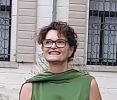Studying at the University of Verona
Here you can find information on the organisational aspects of the Programme, lecture timetables, learning activities and useful contact details for your time at the University, from enrolment to graduation.
Academic calendar
The academic calendar shows the deadlines and scheduled events that are relevant to students, teaching and technical-administrative staff of the University. Public holidays and University closures are also indicated. The academic year normally begins on 1 October each year and ends on 30 September of the following year.
Course calendar
The Academic Calendar sets out the degree programme lecture and exam timetables, as well as the relevant university closure dates..
| Period | From | To |
|---|---|---|
| Sem 1A | Sep 23, 2019 | Oct 31, 2019 |
| Sem 1B | Nov 11, 2019 | Jan 11, 2020 |
| Sem 2A | Feb 17, 2020 | Mar 28, 2020 |
| Sem 2B | Apr 6, 2020 | May 30, 2020 |
| Session | From | To |
|---|---|---|
| Sessione d'esame invernale | Jan 13, 2020 | Feb 15, 2020 |
| Sessione d'esame estiva (gli esami sono sospesi durante la sessione di laurea) | Jun 3, 2020 | Jul 25, 2020 |
| Sessione d'esame autunnale | Aug 24, 2020 | Sep 19, 2020 |
| Session | From | To |
|---|---|---|
| Sessione di laurea estiva | Jul 6, 2020 | Jul 11, 2020 |
| Sessione di laurea autunnale 19-20 | Nov 2, 2020 | Nov 7, 2020 |
| Period | From | To |
|---|---|---|
| Festa di Ognissanti | Nov 1, 2019 | Nov 1, 2019 |
| Sospensione delle lezioni | Nov 2, 2019 | Nov 2, 2019 |
| Festa dell'Immacolata | Dec 8, 2019 | Dec 8, 2019 |
| Vacanze di Natale | Dec 23, 2019 | Jan 6, 2020 |
| Vacanze di Pasqua | Apr 10, 2020 | Apr 14, 2020 |
| Festa della Liberazione | Apr 25, 2020 | Apr 25, 2020 |
| Festa del Lavoro | May 1, 2020 | May 1, 2020 |
| Sospensione delle lezioni | May 2, 2020 | May 2, 2020 |
| Festa del Santo Patrono | May 21, 2020 | May 21, 2020 |
| Sospensione delle lezioni | May 22, 2020 | May 23, 2020 |
| Festa della Repubblica | Jun 2, 2020 | Jun 2, 2020 |
| Vacanze estive | Aug 10, 2020 | Aug 15, 2020 |
Exam calendar
Exam dates and rounds are managed by the relevant Culture and Civilisation Teaching and Student Services Unit.
To view all the exam sessions available, please use the Exam dashboard on ESSE3.
If you forgot your login details or have problems logging in, please contact the relevant IT HelpDesk, or check the login details recovery web page.
Academic staff
 augusto.barbi@univr.it
augusto.barbi@univr.it

Bassetti Massimiliano
 massimiliano.bassetti@univr.it
massimiliano.bassetti@univr.it
 045802 8376
045802 8376
 andrea.chiurato@univr.it
andrea.chiurato@univr.it
Hatzikiriakos Alexandros Maria
 alexandrosmaria.hatzikiriakos@univr.it
alexandrosmaria.hatzikiriakos@univr.it
 dino.piovan@univr.it
dino.piovan@univr.it
 alberto.scandola@univr.it
alberto.scandola@univr.it
Tani Stefano
 stefano.tani@univr.it
stefano.tani@univr.it
 +39 045802 8110
+39 045802 8110
 luciamaddalena.tissi@univr.it
luciamaddalena.tissi@univr.it
 carlo.vannini@accademiabelleartiverona.it
carlo.vannini@accademiabelleartiverona.it
 gianmaria.varanini@univr.it
gianmaria.varanini@univr.it
Study Plan
The Study Plan includes all modules, teaching and learning activities that each student will need to undertake during their time at the University.
Please select your Study Plan based on your enrollment year.
1° Year
| Modules | Credits | TAF | SSD |
|---|
1 module to be chosen among the following2 modules to be chosen among the following1 module to be chosen between the following2° Year activated in the A.Y. 2020/2021
| Modules | Credits | TAF | SSD |
|---|
2 modules to be chosen among the following1 module to be chosen among the following1 module to be chosen among the following| Modules | Credits | TAF | SSD |
|---|
1 module to be chosen among the following2 modules to be chosen among the following1 module to be chosen between the following| Modules | Credits | TAF | SSD |
|---|
2 modules to be chosen among the following1 module to be chosen among the following1 module to be chosen among the following| Modules | Credits | TAF | SSD |
|---|
Legend | Type of training activity (TTA)
TAF (Type of Educational Activity) All courses and activities are classified into different types of educational activities, indicated by a letter.
Roman History (m) (2019/2020)
Teaching code
4S02304
Teacher
Coordinator
Credits
6
Also offered in courses:
- Roman History (m) of the course Master's degree in Philosophy
- Roman History I - LM [Sede VR] of the course Master's degree in Arts (interuniversity)
Language
Italian
Scientific Disciplinary Sector (SSD)
L-ANT/03 - ROMAN HISTORY
Period
Sem 2A dal Feb 17, 2020 al Mar 28, 2020.
Learning outcomes
The course will give students the conceptual, methodological and cultural background for analyzing and interpreting the most important problems of Roman history, in light of the most recent historiograpy. It will also aim to develop the skills for a correct and appropriate language and for a better knowledge of the main aspects of Latin civilization.
Program
Part I
- From Republic to Principate.
- The julian-claudian dynasty
- The Flavi.
- From Nerva to Commodo.
- The Severi and the Gordians.
- Economic and Social problems of II and III Century AD.
- Diocletian's Reforms.
- Constantinuse.
Part II
- History of Roman historiography.
- The Annalists.
- History and biography.
- Commentaries and works of erudition.
Didactic methods
For attending students, teaching methods consist of lectures dedicated to the transmission of
basic notions and basic tools of work. b. Attending students will receive at the first lesson the complete calendar of didactic activities with the dates and topics covered in the lessons provided by the time, the classroom and the indication of possible suspension for academic reasons.
Throughout the academic year, there is also available the individual reception service handled by the teacher at the timetable indicated on the teacher's web pages.
With regard to non-attending students, teaching methods consist of a support teacher for personal study of the manuals during the talks, also attached to the outside the scheduled time and providing, on request, additional teaching materials.
| Author | Title | Publishing house | Year | ISBN | Notes |
|---|---|---|---|---|---|
| Faoro D. (ed.) | L'amministrazione dell'Italia romana | Le Monnier | 2018 | ||
| Giorcelli Bersani Silvia | L'impero in quota. I Romani e le Alpi | Einaudi | 2019 | 9788806235130 | |
| Gabrielli, Chantal | Moneta e finanza a Roma in età repubblicana | Carocci | 2012 | ||
| Giuffrida, Cassia, Arena | Roma e la sua storia | Il Mulino | 2019 | ||
| G. Zecchini | Storia della storiografia romana | Laterza, Bari | 2016 |
Examination Methods
Verification of learning outcomes for both attending and non-attending students is an oral interview.
Due to the Coronavirus pandemic, and in accordance with the University of Verona guidelines, during the 2020 summer session the assessment modality will be modified as follows: [online oral exam
Objectives of the verification test
- Verify the amplitude and depth of the acquired knowledges.
- Check the analytical and argumentative capabilities
- Check the skills acquired reading and commenting a simple epigraphic text.
The interview will cover al the program and will be in Italian, also for ERASMUS students. The vote will be expressed in 30/30.
Type D and Type F activities
| years | Modules | TAF | Teacher |
|---|---|---|---|
| 1° 2° | The origins of Christianity | F |
Augusto Barbi
(Coordinator)
|
| years | Modules | TAF | Teacher |
|---|---|---|---|
| 1° 2° | Laboratory of ancient greek | F |
Dino Piovan
(Coordinator)
|
| 1° 2° | Latin Laboratory | F |
Giulia Beghini
(Coordinator)
|
| 1° 2° | Opera Workshop | F |
Nicola Pasqualicchio
(Coordinator)
|
| 1° 2° | Presente e futuro del pianeta. economia, sostenibilità e politiche | F |
Gian Maria Varanini
(Coordinator)
|
| years | Modules | TAF | Teacher |
|---|---|---|---|
| 1° 2° | The origins of Christianity | F |
Augusto Barbi
(Coordinator)
|
| years | Modules | TAF | Teacher |
|---|---|---|---|
| 1° 2° | Convegno internazionale “la questio de aqua et terra di dante alighieri: testo e contesto” | F |
Paolo Pellegrini
(Coordinator)
|
| 1° 2° | Laboratory of ancient greek | F |
Dino Piovan
(Coordinator)
|
| 1° 2° | Latin Laboratory | F |
Giulia Beghini
(Coordinator)
|
| 1° 2° | Opera Workshop | F |
Nicola Pasqualicchio
(Coordinator)
|
| 1° 2° | Presente e futuro del pianeta. economia, sostenibilità e politiche | F |
Gian Maria Varanini
(Coordinator)
|
| 1° 2° | Un patrimonio urbano da ri-conoscere e ri-valutare: ville e palazzi storici di verona e circondario | F |
Gian Maria Varanini
(Coordinator)
|
| years | Modules | TAF | Teacher |
|---|---|---|---|
| 1° 2° | Giornate fai di primavera (1 cfu) | F |
Monica Molteni
(Coordinator)
|
| 1° 2° | Laboratory of photo | F |
Carlo Vannini
(Coordinator)
|
| 1° 2° | Laboratory of ancient greek | F |
Dino Piovan
(Coordinator)
|
| 1° 2° | Humanistic informatics laboratory (m) | F |
Stefano Minozzi
(Coordinator)
|
| 1° 2° | Latin Laboratory | F |
Giulia Beghini
(Coordinator)
|
| 1° 2° | Worshop for cultral events | F | Not yet assigned |
| years | Modules | TAF | Teacher |
|---|---|---|---|
| 1° 2° | Fai un giro in villa (1 cfu) | F |
Monica Molteni
(Coordinator)
|
| 1° 2° | Laboratory of ancient greek | F |
Dino Piovan
(Coordinator)
|
| 1° 2° | Humanistic informatics laboratory (m) | F |
Stefano Minozzi
(Coordinator)
|
| 1° 2° | Latin Laboratory | F |
Giulia Beghini
(Coordinator)
|
| 1° 2° | Worshop for cultral events | F | Not yet assigned |
| years | Modules | TAF | Teacher |
|---|---|---|---|
| 1° 2° | Summer School internazionale in Studi danteschi Ravenna-Verona | F |
Paolo Pellegrini
(Coordinator)
|
| 1° 2° | Univero’ 2019 | F | Not yet assigned |
Career prospects
Module/Programme news
News for students
There you will find information, resources and services useful during your time at the University (Student’s exam record, your study plan on ESSE3, Distance Learning courses, university email account, office forms, administrative procedures, etc.). You can log into MyUnivr with your GIA login details: only in this way will you be able to receive notification of all the notices from your teachers and your secretariat via email and also via the Univr app.
Graduation
List of thesis proposals
| theses proposals | Research area |
|---|---|
| tesi di Glottologia, Storia comparata, Linguistica storica | ENGLISH LANGUAGE - Grammar and Syntax – Grammatik und Syntax |
| tesi di Glottologia, Storia comparata, Linguistica storica | GERMANIC LANGUAGE - Dialectology - Dialektologie |
| tesi di Glottologia, Storia comparata, Linguistica storica | HUMANITIES & SOCIAL STUDIES - HUMANITIES & SOCIAL STUDIES |
| tesi di Glottologia, Storia comparata, Linguistica storica | Indo-European languages & literatures - Indo-European languages & literatures |
| tesi di Glottologia, Storia comparata, Linguistica storica | LINGUISTICS - LINGUISTICS |
Gestione carriere
Linguistic training CLA
Student mentoring
Requisiti classi di abilitazione insegnamento
Requisiti necessari per accedere alle classi di abilitazione per l'insegnamento.
vedi allegato pdf
Inoltre, per informazioni sui 24 CFU nelle discipline antropo-psico-pedagogiche e nelle metodologie e tecnologie didattiche, si veda -> LINK
Documents
| Title | Info File |
|---|---|
|
|
pdf, it, 307 KB, 30/11/21 |
Student login and resources
Modalità e sedi di frequenza
La frequenza non è obbligatoria.
Maggiori dettagli in merito all'obbligo di frequenza vengono riportati nel Regolamento del corso di studio disponibile alla voce Regolamenti nel menu Il Corso. Anche se il regolamento non prevede un obbligo specifico, verifica le indicazioni previste dal singolo docente per ciascun insegnamento o per eventuali laboratori e/o tirocinio.
È consentita l'iscrizione a tempo parziale. Per saperne di più consulta la pagina Possibilità di iscrizione Part time.
Le sedi di svolgimento delle lezioni e degli esami sono le seguenti:
- Polo Zanotto (vicino si trova il Palazzo di Lettere)
- Palazzo ex Economia
- Polo Santa Marta
- Istituto ex Orsoline
- Palazzo Zorzi (Lungadige Porta Vittoria, 17 - 37129 Verona)




































